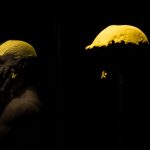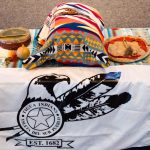Research
Careful provenance research of collections from a colonial context contributes to knowledge and understanding of this heritage, to acknowledgment and redress of injustice, and to cooperation with countries of origin. Additionally, provenance research helps heritage institutions to better understand their own role in the colonial past. Provenance research also forms the basis on which restitution requests from countries of origin are assessed. On this page you will find information about provenance research: tools for research, informative blogs, provenance reports and opportunities for funding.
Tools: how do you conduct provenance research?
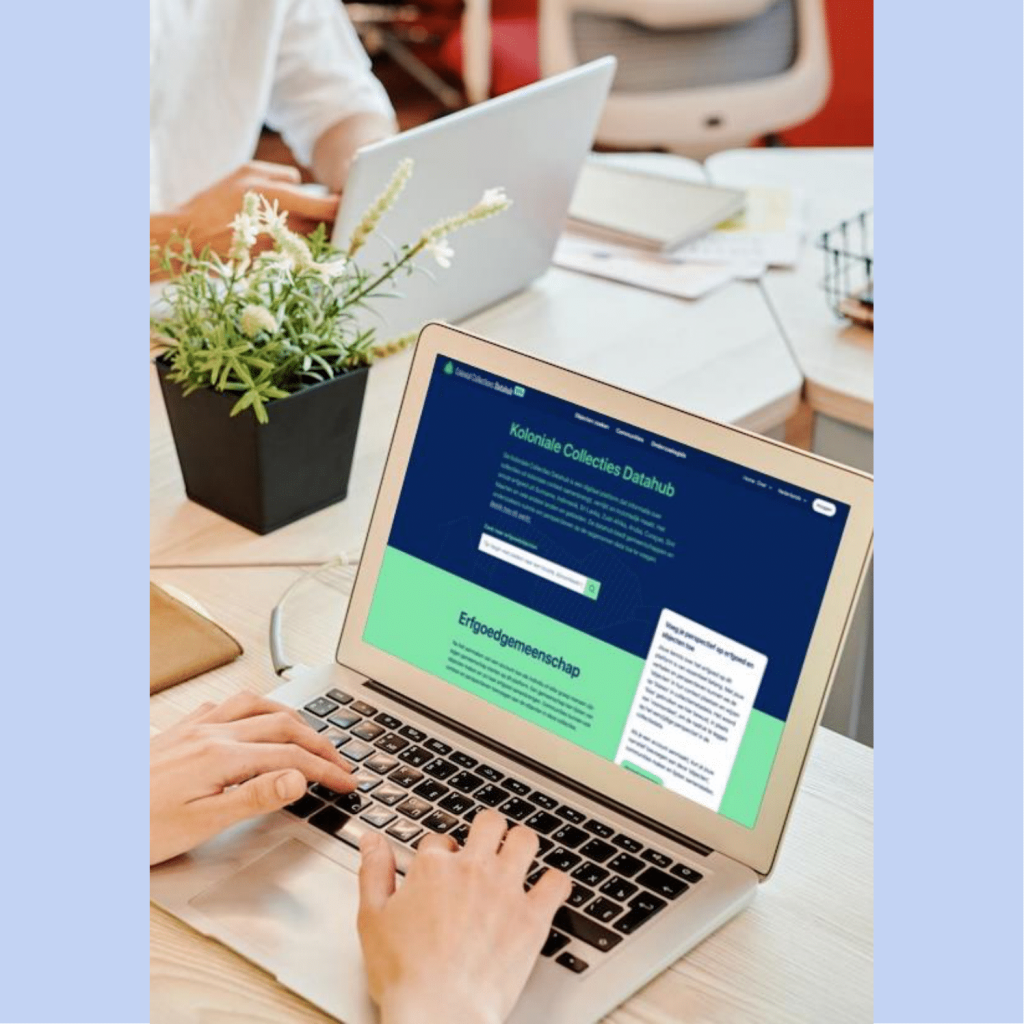
The Research Aids were created by NIOD to assist you in doing (provenance) research on objects that were acquired in a colonial context and currently part of museum collections in the Netherlands. The Research Aids provide a brief description, specific research tips and references to relevant source material.
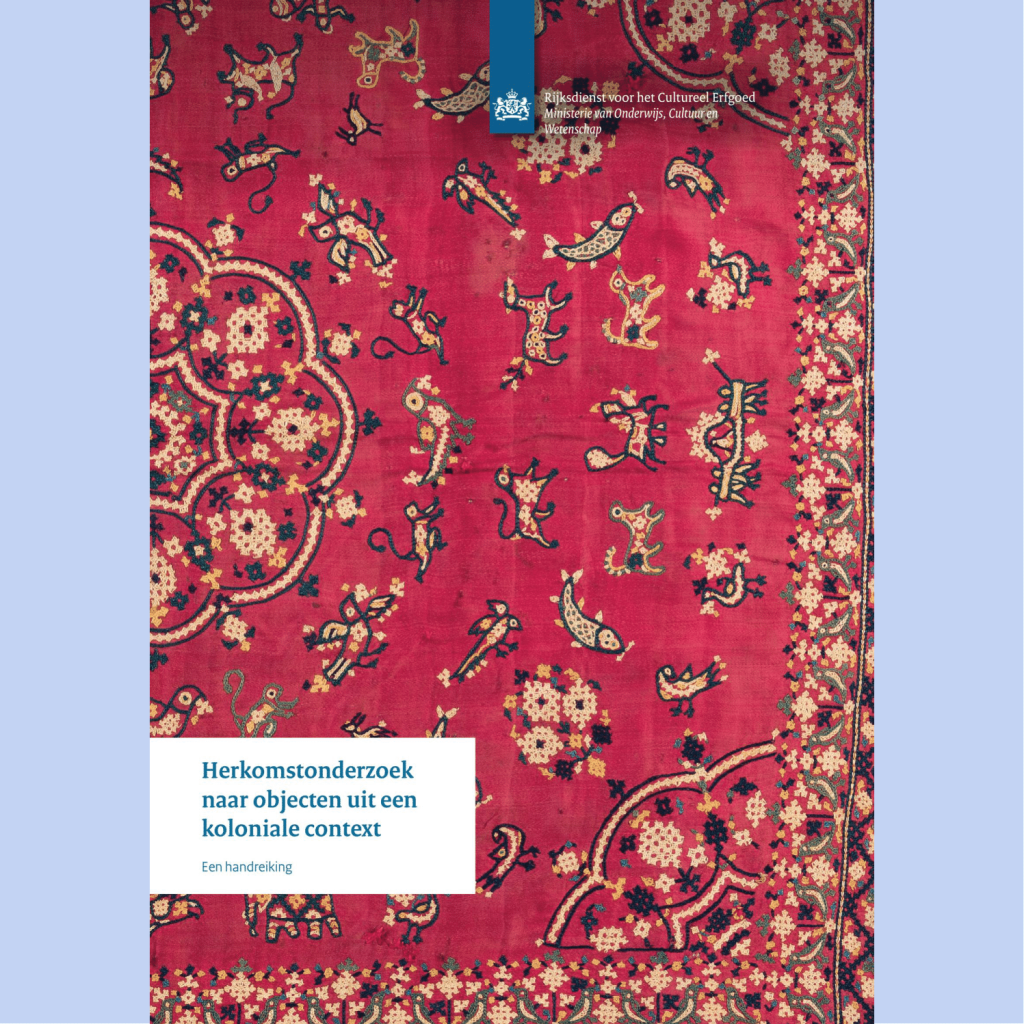
This publication by the Cultural Heritage Agency of the Netherlands (RCE) helps museums and other heritage institutions that manage objects from a colonial context in starting provenance research.
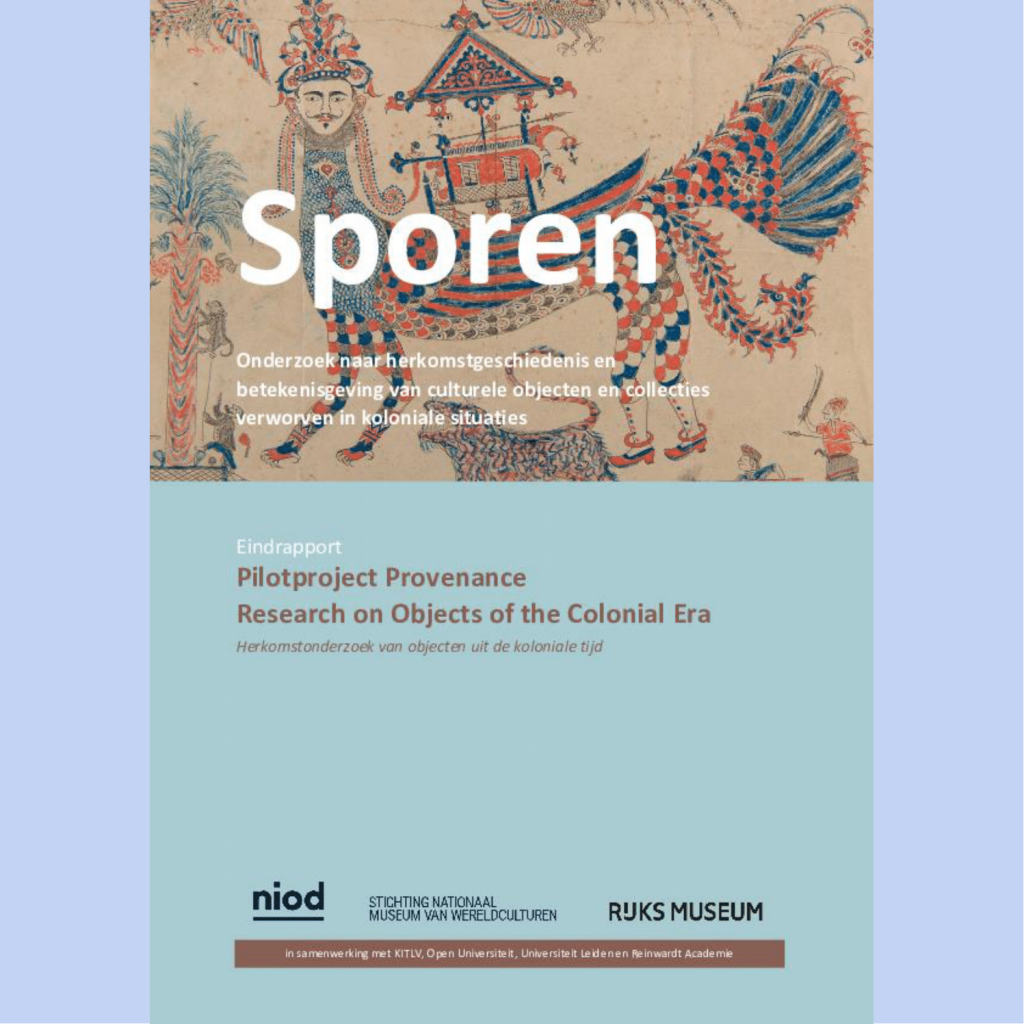
Het Pilotproject Provenance Research on Objects of the Colonial Era (PPROCE) took place between 2019 and 2022, to develop a research methodology for provenance research into colonial collections.
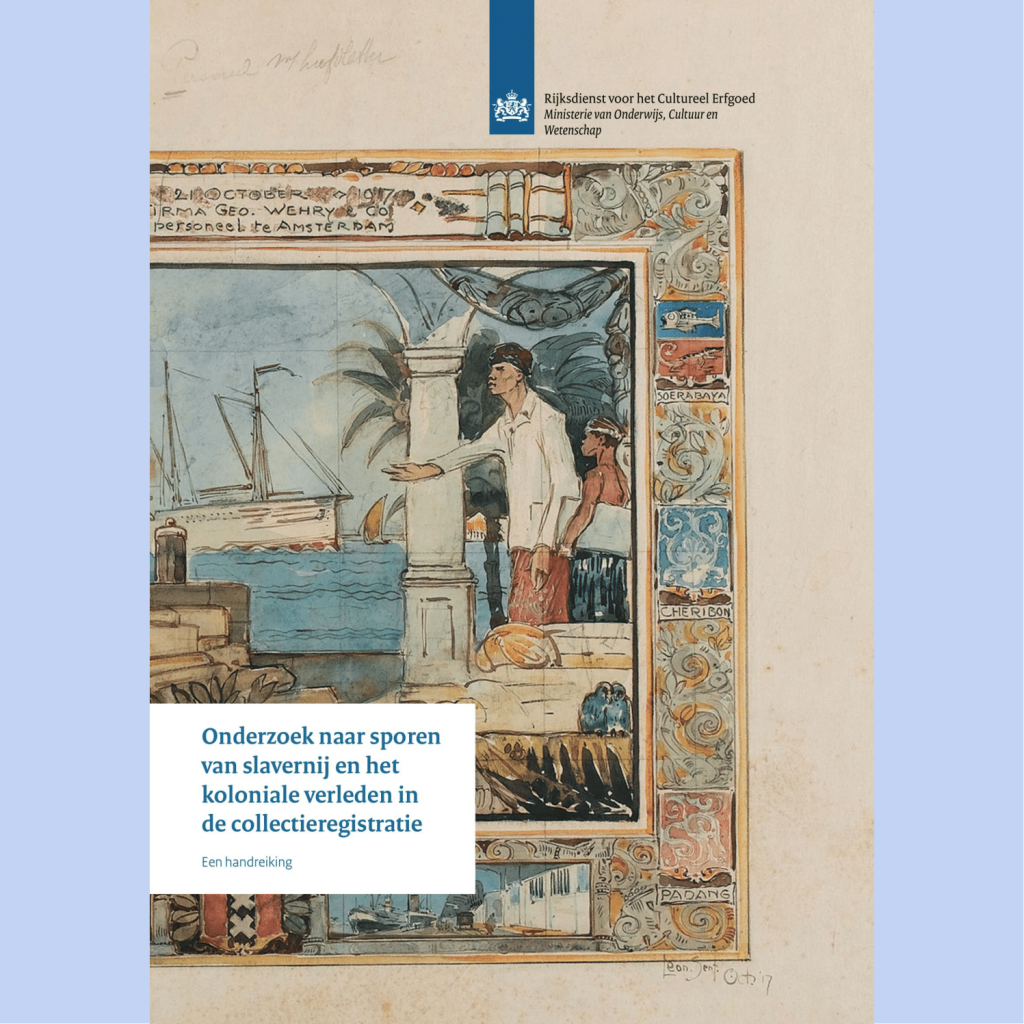
How do you search for traces of slavery and the colonial past in the collection registration? This publication offers support in starting this kind of research. This publication is in Dutch.
Blogs
In the blog series of the Colonial Collections Consortium, we present a historical object or collection from a former colonial context or situation, currently (or until recently) stored in a museum in the Netherlands that has been the focus of provenance research. With these blogs, we want to give an insight into the importance of provenance research and show the different ways of approaching this type of research. Therefore, each blog explains the steps taken by the respective museum or provenance researcher to carry out the research. Which stories lie behind the object and what can they tell us about the Dutch colonial past?
Current research
In 2024 and 2025, the Colonial Collections Consortium made budget available for provenance research on colonial collections. Dutch heritage institutions, located in the country of the Netherlands, such as museums, universities, archives and libraries, could submit applications for this budget to the Wereldmuseum, a partner of the Colonial Collections Consortium under the “Regeling Herkomstonderzoek Koloniale Collecties”. Below you will find more information about the current research projects.
Open for applications: provenance research into colonial collections
First round of applications closed
On 15 March 2025, the first round of applications for the ‘Regeling Herkomstonderzoek Koloniale Collecties,’ was closed. The assessment committee will gather shortly to assess all…
Online Consultations for Scheme Provenance Research Colonial Collections
Ten museums receive grant for provenance research into colonial collections
Second round of applications closed
On 15 July 2025, the second round of applications for the ‘Regeling Herkomstonderzoek Koloniale Collecties,’ was closed. The assessment committee will gather shortly to assess all…
Grant awarded to eleven museums for provenance research into colonial collections
Further reading
Do you want to continue reading about provenance research into colonial collections? Below you will find publications, organisations and websites where you can find more about this topic.
Publications (A-Z)
- Advisory report ‘Colonial Collections and a Recognition of Injustice’
In July 2020, the advisory report Colonial Collection and a Recognition of Injustice was published by the Advisory Committee on the National Policy Framework for Colonial Collections of the Council for Culture. The aim of the Committee was to develop a national policy framework for collections with a colonial context. The committee developed a vision for the future of colonial heritage, and in particular, developed policy on how to handle (requests for) restitution of colonial heritage. On 7 October 2020, the report was presented to the Minister of Education, Culture and Science. - Advisory reports Colonial Collections Committee
The independent Colonial Collections Committee advises the Minster of Education, Culture and Science about restitution requests for objects from a colonial context based on provenance research. An object’s provenance report is included in the attachments of the advisory report. These are publicly available for everyone on the Committee’s website. - First inventory of objects from Suriname in the Netherlands
In April 2024, a Netherlands delegation visited Suriname, during which agreements were made about cooperation in the field of colonial collections. For this visit, the Colonial Collections Consortium mapped out which objects are present in Dutch public collections through the colonial history of the Netherlands and Suriname. - Colonial Collections Datahub
The Colonial Collections Datahub is a digital platform that brings together, enriches and provides insights into information on collections from colonial contexts. It includes heritage from Suriname, Indonesia, Sri Lanka, South Africa, Aruba, Curaçao, Sint Maarten and many other countries and areas. The datahub provides communities and researchers space to add perspectives on the included data. - Provenance Stories | Rijksdienst voor het Cultureel Erfgoed
As a pilot project, the Cultural Heritage Agency of the Netherlands researched the provenance of six objects from a colonial context currently present in their collection. Each objects has its own history and asks for a unique approach. Therefore, several specialists (duos) were asked to conduct this research. The blog series ‘Provenance Stories’ follows their approach and outlines their findings. These blogs are only available in Dutch.
- Provenance Series | Wereldmuseum
The Provenance Series is a series of publications about provenance research for objects and collections managed by the Wereldmuseum. In 2023, the Tropenmuseum in Amsterdam and the Museum Volkenkunde in Leiden merged with the Wereldmuseum Rotterdam and continued under one name: Wereldmuseum. - Threads of Time | Pressing Matter
Between 2021 and 2025, a team of researchers in museums and at universities in the Netherlands, of artists , critical friends, winter school participants and many others from around the world have been collaborating in the research project Pressing Matter – Ownership, Value and the Question of Colonial Heritage in Museums. It is their ambition that the network that emerged from the project remains intact, in order to continue the discussions on what they label as ‘Critical Provenance Research’. The series of provenance research reports ‘Threads of Time’ is one of the means to maintain and extend this network.
Organisations (A-Z)
- Colonial Collections Committee
The independent Colonial Collections Committee advises the Minister of Education, Culture and Science about restitution requests for cultural goods that were removed from a colonial context. Their advisory reports become available to the public after the Minister’s decision. An object’s provenance report is included in the attachments of the advisory report. These are publicly available for everyone on the Committee’s website. - Disrupting & Reorienting Restitution
From the alumni group of TheMuseumsLab 2022, a new collective emerged: Disrupting & Reorienting Restitution. Their aim is to disrupt and reorient the conversation around restitution and repatriation, in which they amplify voices from Africa and the Diaspora. - Mapping Slavery
This online platform maps historical places from the Dutch slavery past as well as heritage from the Dutch colonial ‘empire.’ - Museumvereniging
The Museumvereniging is the industry organisation for museums in the Netherlands. They represent the interests of the museum sector in areas of politics, public and other stakeholders. The association encourages collaboration between museums, the professionalization of the sector and the museum visit. The knowledge base of the Museumvereniging brings together articles about the museum field and museum management. - Pressing Matter
Pressing Matter is a four-year (2021-2025) international research programme about colonial heritage and its legacies, financed by the Dutch National Science Agenda (NWA) and coordinated from the Vrije Universiteit Amsterdam. Academics, researchers, artists and museum professionals investigate how colonial heritage can contribute to reconciliation with the colonial past and its impacts our current and future society. For years, objects that were considered beautiful art pieces, often hold deeper meaning in the country of origin. Additionally, objects often have great meaning for the identity of a country or community. Pressing Matter researches, reflects and evaluates these topics. - Restitution Matters
RM* reports news about collections from former colonial territories and their future, enabling heritage enthusiasts to inform themselves about developments in this field and reducing the knowledge gap between the global south and the global north. - Cultural Heritage Agency of the Netherlands (RCE)
The RCE is part of the Dutch Ministry of OCW (Education, Culture and Science) and implements laws, regulations and policy, provides advice and develops practically applicable knowledge for those who manage heritage. This is done in cooperation with the heritage field, the ministries of OCW and Foreign Affairs, and an (inter)national network. The RCE manages part of the national collection and has expertise on colonial collections. When returning objects, the RCE coordinates the physical transfer if required. - Routes to Return
On the digital platform Routes to Return, museum and heritage professional Amy Shakespeare (UK) brings together national policy frameworks on how to manage and restitute colonial collections.
Contact
Do you have any questions about the Dutch policy about how to proceed with colonial collections, provenance research or the Consortium Colonial Collections? We have already answered the most frequently asked questions.
